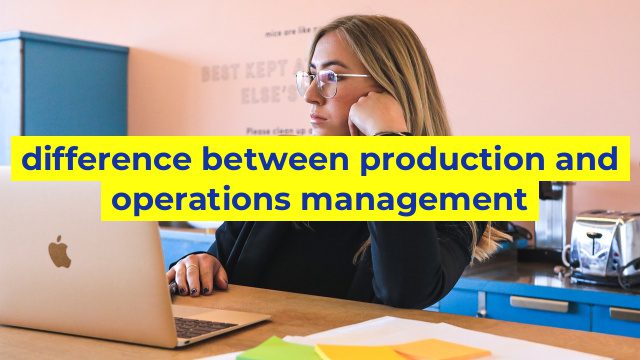Difference Between Production and Operations Management
When it comes to business management, production and operations management are two terms that often get used interchangeably. However, they are not the same thing, and understanding the differences is crucial for anyone looking to work in these fields. In this article, we’ll explore the key distinctions between production and operations management.
What is Production Management?
Production management focuses on the actual manufacturing process of products or goods. This can involve everything from sourcing materials to assembly, quality control, and distribution. The goal of production management is to ensure that goods are produced efficiently, effectively, and economically. This involves optimizing the use of resources, minimizing waste and downtime, and maintaining high levels of quality throughout the process.
Some key activities of production management include:
– Production planning and scheduling
– Inventory management
– Quality control and inspection
– Maintenance and repair of production equipment
– Supply chain management
What is Operations Management?
Operations management, on the other hand, is a broader term that encompasses more than just the manufacturing process. Operations management is concerned with overseeing all aspects of a company’s operations, including production, service delivery, and customer support. This can involve a wide range of activities, from managing staff and resources to marketing and sales.
Some key activities of operations management include:
– Strategic planning and goal setting
– Resource allocation and management
– Staffing and training
– Marketing and sales
– Customer service and support
The Key Differences
While there is some overlap between production and operations management, there are several key differences that set them apart. Here are some of the most important distinctions:
– Focus: Production management focuses specifically on the manufacturing process, while operations management covers all aspects of a company’s operations.
– Scope: Production management deals with the actual production of goods, while operations management encompasses all parts of the company’s activities.
– Goals: Production management aims to optimize the production process in terms of efficiency, effectiveness, and economy, while operations management sets more general goals and objectives for the entire company.
– Skills: Production management requires specific technical skills related to manufacturing, while operations management requires a more general set of leadership, management, and business skills.
Conclusion
In summary, production management and operations management are two distinct fields that require different skill sets and focus on different aspects of a company’s operations. While they share some similarities, understanding the differences between them is important for anyone looking to work in these fields. Whether you’re interested in manufacturing or overseeing a broader range of operations, there are plenty of opportunities available in both production and operations management.
Table difference between production and operations management
| Production Management | Operations Management | |
|---|---|---|
| Definition | The process of managing and coordinating the production process to produce goods and services efficiently and effectively. | The management of all the activities required to create and deliver goods and services to customers. |
| Scope | Focuses only on the production of goods and services. | Covers all areas of the organization, including production, marketing, finance, and human resources. |
| Goal | To produce goods and services efficiently and effectively to meet customer demand and maximize profit. | To deliver goods and services to customers effectively and efficiently to meet their needs and maximize profit. |
| Responsibility | Generally responsible for the production process, including planning, scheduling, and controlling the production of goods and services. | Responsible for the entire operations process, including planning, scheduling, controlling, and coordinating all organizational activities related to the production and delivery of goods and services. |
| Focus | Focuses on the technical aspects of production, such as quality control, material procurement, and production planning. | Focuses on the strategic aspects of operations management, such as supply chain management, logistics, and customer service. |
| Tools and Techniques | Uses tools such as production planning, scheduling, quality control, and material requirements planning. | Uses tools such as supply chain management, logistics, capacity planning, demand forecasting, and process improvement. |
